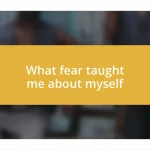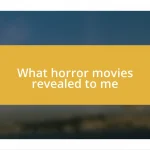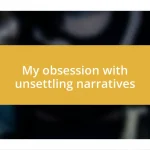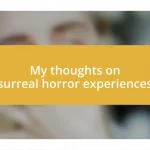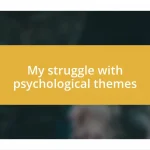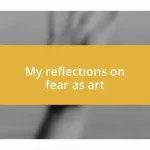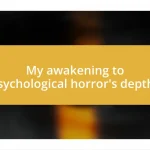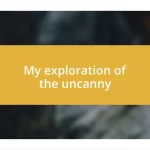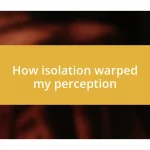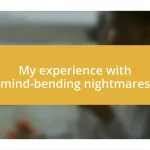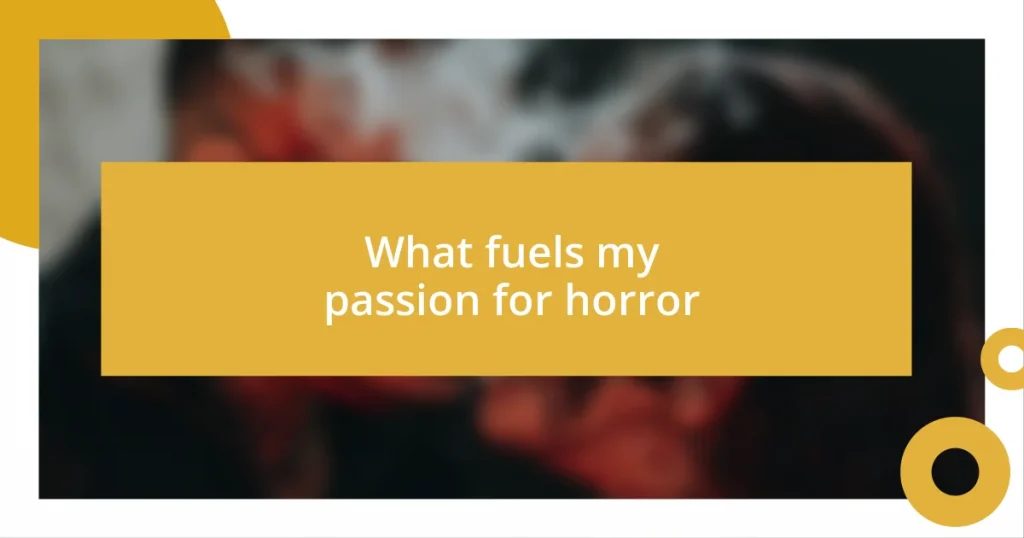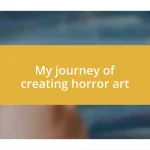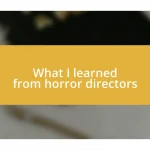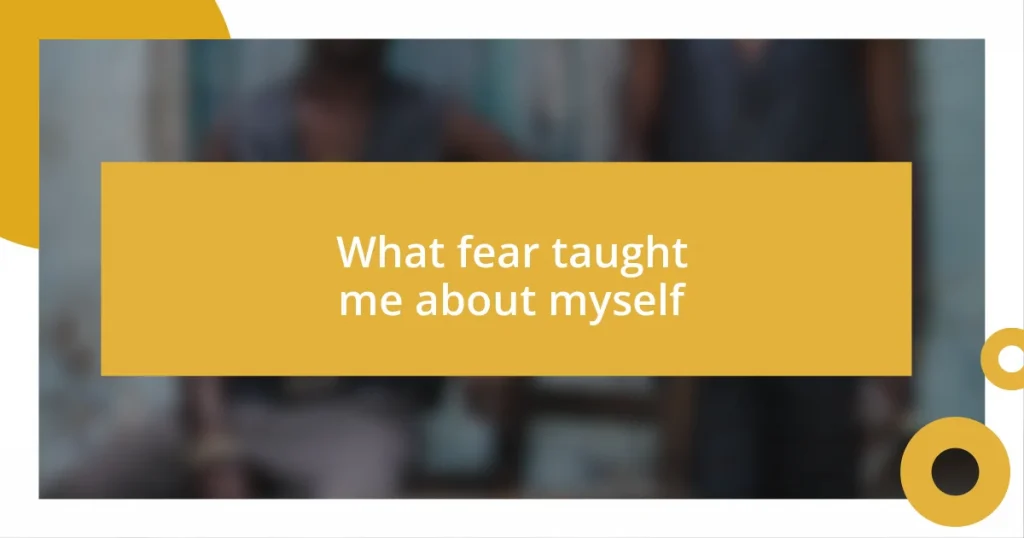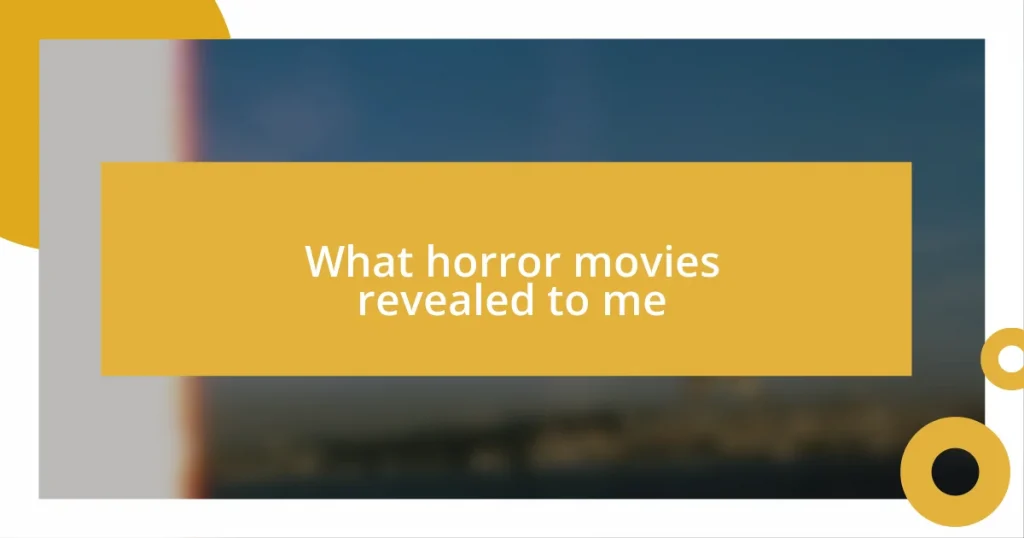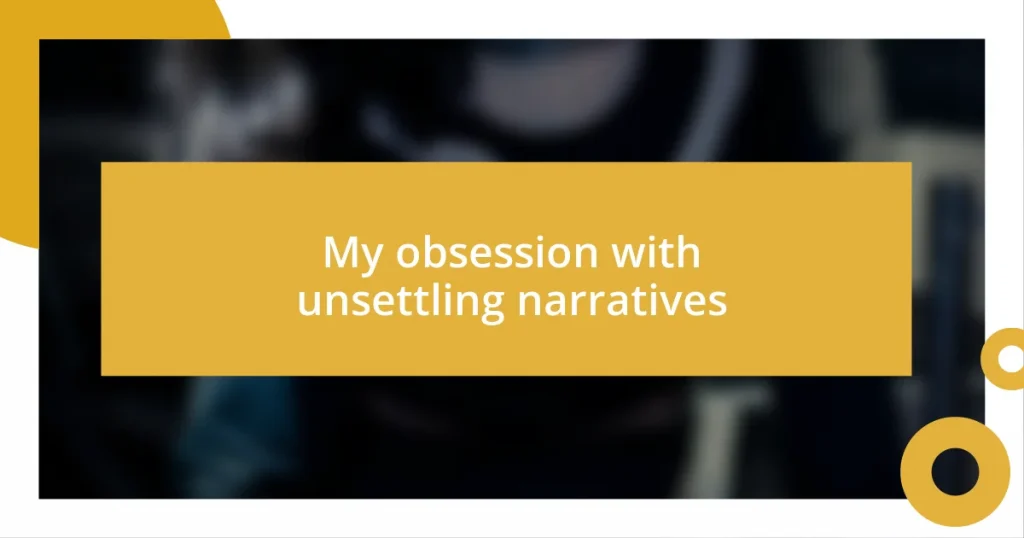Key takeaways:
- The author experiences a thrilling mix of adrenaline and introspection while engaging with horror films and literature, exploring personal fears and societal anxieties.
- Childhood influences, such as watching classic horror movies and sharing ghost stories, ignited a lifelong fascination with the genre, blending fear and curiosity.
- Horror serves as a safe space for emotional exploration and creativity, fostering connections with others and inspiring the author to create their own chilling narratives.
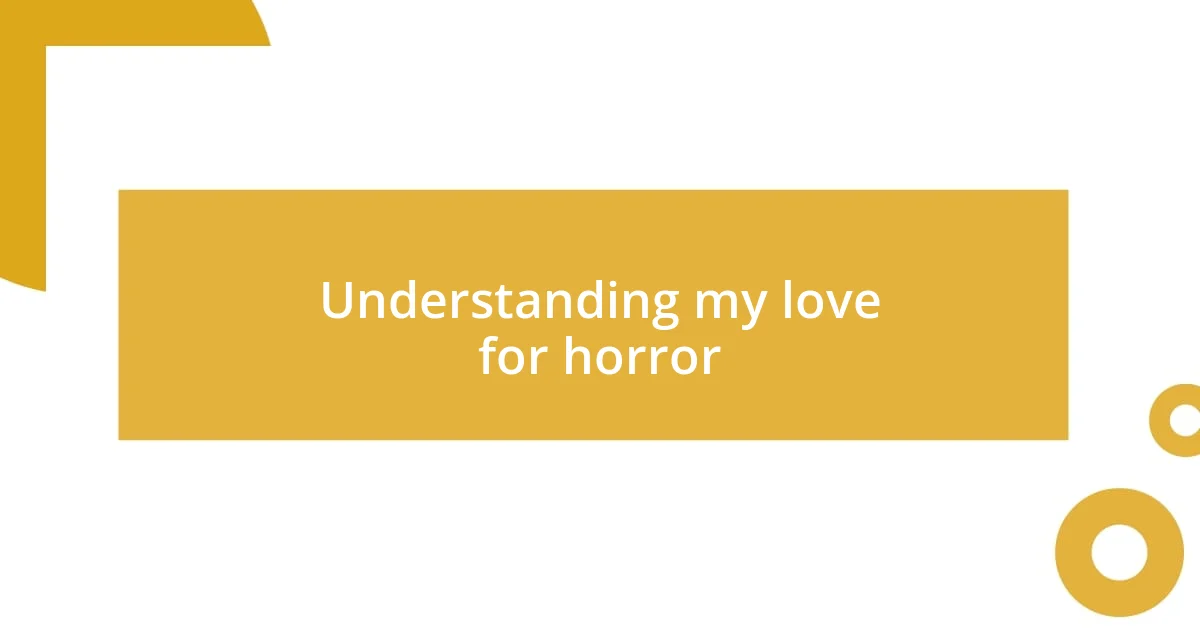
Understanding my love for horror
Every time I watch a horror film, I feel a rush of adrenaline that’s hard to describe. It’s as if I’m stepping into a thrilling rollercoaster, where each twist and turn keeps me guessing. Isn’t it fascinating how fear can become a source of excitement rather than just discomfort?
I remember the first time I got lost in a Stephen King novel. The way he crafted suspense made my heart race, but it also mesmerized me. I found myself thinking, “Why do I keep turning the pages, even when I know I should be scared?” That blend of thrill and terror is addictive; it’s a dance between fear and fascination that I can’t resist.
Horror also allows me to explore the darker sides of humanity in a safe environment. It’s a chance to confront my fears and understand them better. As I navigate through these chilling narratives, I often ask myself what truly frightens me — and why it draws me in. This exploration makes my love for horror deeply personal, revealing layers of my psyche I might not otherwise confront.
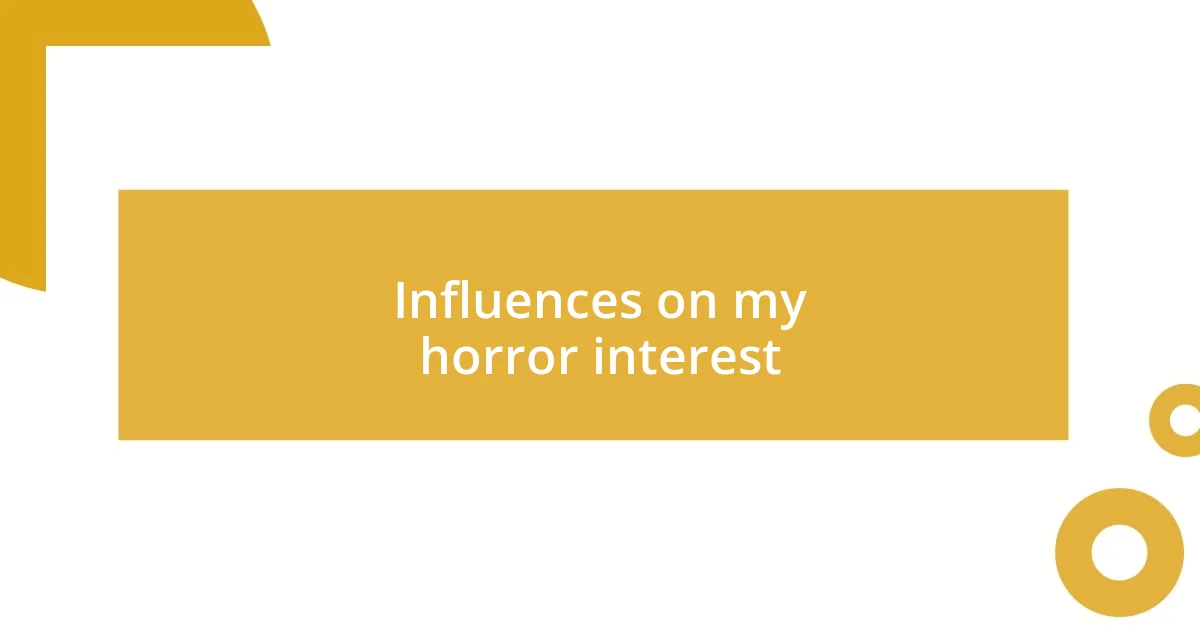
Influences on my horror interest
The influences on my horror interest have a couple of roots that run deep. I grew up watching classic horror movies with my older sibling, who would mimic the iconic villains and challenge me to guess what would happen next. Those campy scares transformed my fear into fascination, igniting a curiosity about the genre that has only grown over the years.
As I delved into literature, I discovered that authors like H.P. Lovecraft opened my eyes to a different kind of horror—one steeped in cosmic fear and existential dread. Their stories pushed me to ponder life’s big questions while simultaneously keeping me on edge. I often found myself pondering, “What if things were truly outside my understanding?” This dual impact—entertainment and introspection—makes horror a unique escape, one that is almost meditative despite the sheer terror involved.
Another significant influence came from personal experiences. I once took a night walk through an old, supposedly haunted part of town. The atmosphere felt electric, and I could almost hear whispers of long-forgotten tales. That night etched a sense of thrill in me, revealing how real-life moments can heighten the allure of horror fiction. It’s those lived experiences that have shaped my appreciation, blending fear with rich storytelling that leaves a lasting impression.
| Influence | Impact on My Interest |
|---|---|
| Watching Classic Horror Movies | Transformed fear into fascination, igniting curiosity |
| Exploring Literature by Authors Like Lovecraft | Provoked deep philosophical questions while keeping me on edge |
| Personal Experiences in Haunting Locations | Combined real-life thrill with the allure of horror fiction |
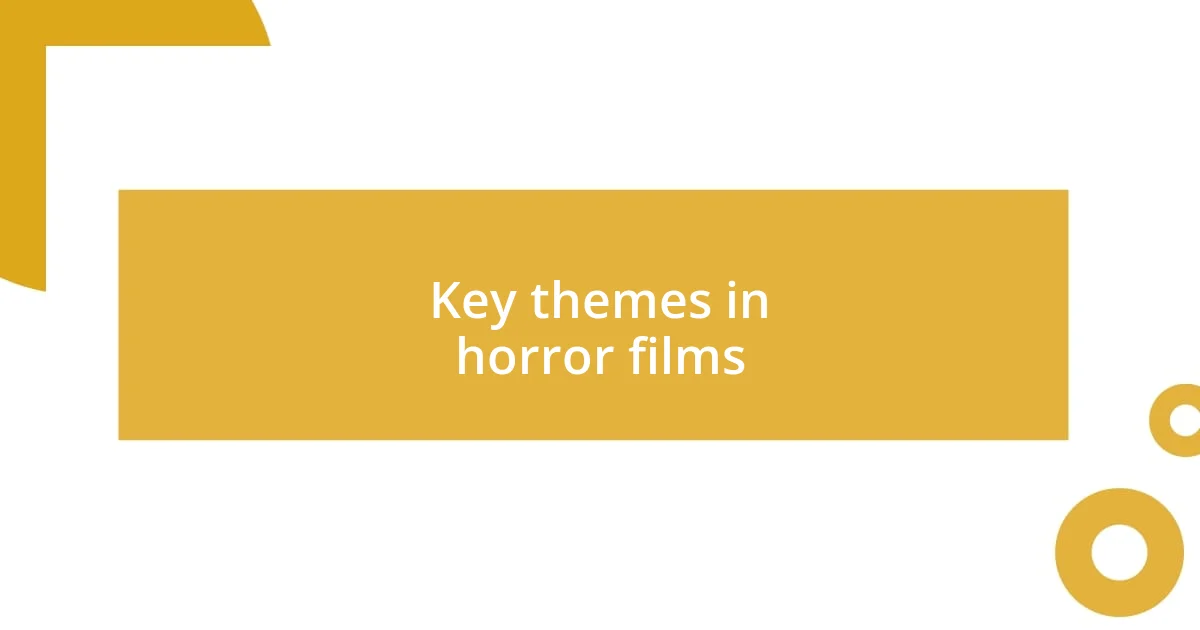
Key themes in horror films
Horror films often center around key themes that resonate deeply with audiences, reflecting our collective fears and uncertainties. I find it intriguing how these themes, like isolation and the unknown, tap into real-life anxieties and transform them into compelling narratives. Each time I watch a film that delves into psychological horror, it evokes a reminder of our vulnerability — an emotion I recognize from my own experiences when I found myself alone after dark, listening to the strange creaks and whispers of an old house.
Here are some key themes often explored in horror films:
- Isolation: Characters are often trapped in remote settings, amplifying their sense of vulnerability.
- The Unknown: Horror thrives on what we can’t see or understand, making us question our perceived reality.
- Fear of Death: Many plots grapple with mortality, confronting characters — and viewers — with their deepest fears.
- Monsters and the Supernatural: These elements symbolize human anxieties and the parts of ourselves that we struggle to acknowledge.
- Psychological Horror: It delves into the mind, showcasing how our fears can become our worst enemies, leading to self-destruction.
Every time I see a story that plays with these themes, I can’t help but reflect on how they mirror the darker corners of my own life. It’s this connection that fuels my passion for horror.
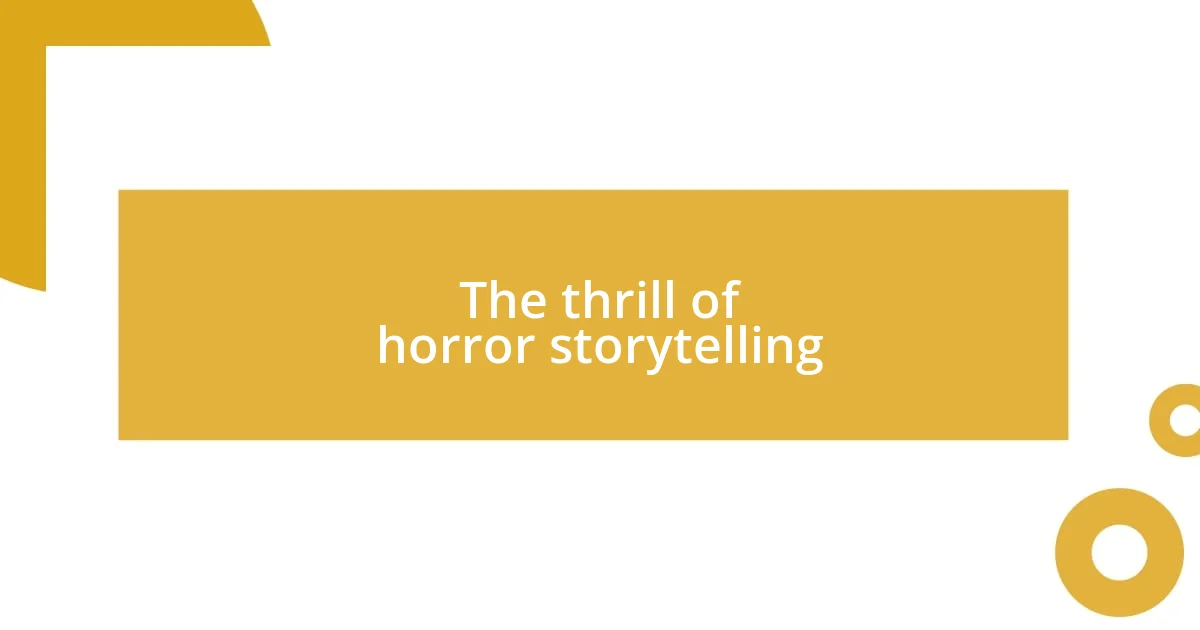
The thrill of horror storytelling
The thrill of horror storytelling lies in the way it grips our emotions, shaking us to our core. I remember my first encounter with a chilling ghost story at a sleepover, where the darkness felt thick and the room was alive with anticipation. As each word was spoken, I felt the adrenaline pulse through me, blurring the lines between reality and fiction. Isn’t it fascinating how a well-told tale can make your heart race and palms sweat?
When I reflect on horror narratives, I often think about the emotional rollercoaster they take us on. It’s not just about scares but the suspense that hangs in the air, each moment packed with tension. I once marathoned horror films with friends, and the silence during the climactic scenes was deafening—who needed dialogue when our wide eyes and shared gasps captured our thoughts? I cherish those times because they embody a collective experience, where fear transforms into a bond that pulls us closer together, even in the face of terror.
Then there’s the intellectual thrill that horror storytelling provides. It makes me ponder deeper questions about life and fear. After finishing a particularly harrowing book, I found myself staring into space, contemplating the thin line between courage and fear. What drives someone to confront their most dreaded nightmares? For me, it’s the exhilaration of exploring those dark corners of the human psyche, where both monsters and resilience coexist.
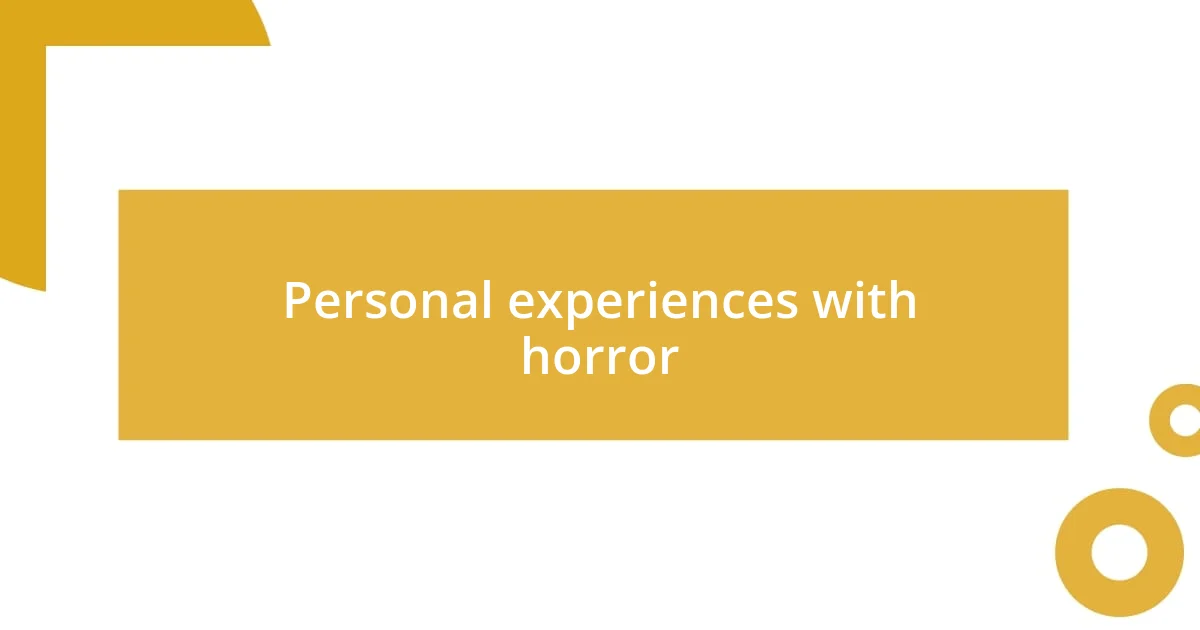
Personal experiences with horror
There’s something incredibly gripping about firsthand encounters with horror. I vividly remember walking through a haunted house attraction during Halloween, surrounded by shadows and screams. My heart raced as I navigated the eerie corridors, a mix of excitement and genuine fear swirling within me. How could a place designed to entertain feel so overwhelmingly real? That moment revealed to me just how powerful our imagination can be when fueled by all that darkness.
One particularly haunting experience occurred during a family camping trip. As dusk fell, my cousins and I decided to share ghost stories around the campfire. The way the flames flickered seemed to breathe life into our tales, and when my cousin recounted the legend of a lost spirit wandering the woods, I felt chills ripple down my spine. From that night onward, every rustle in the bushes sent my mind racing, and the thrill of fear lingered long after the stories ended. Isn’t it fascinating how some experiences can stay with us, whispering echoes of fear long after they’ve faded?
As I grew older, my relationship with horror evolved. I found that diving into horror literature provided a safe space to confront my anxieties. I recollect reading a chilling novel late at night, completely engulfed in its world. The moments of revelation where I had to question what lay beyond the page were intense; it felt like the characters’ fears were mingling with mine. This led me to wonder — can embracing fear through storytelling actually empower us? I believe that these visceral experiences have shaped my passion for horror, encouraging me not just to face my fears, but to celebrate them.
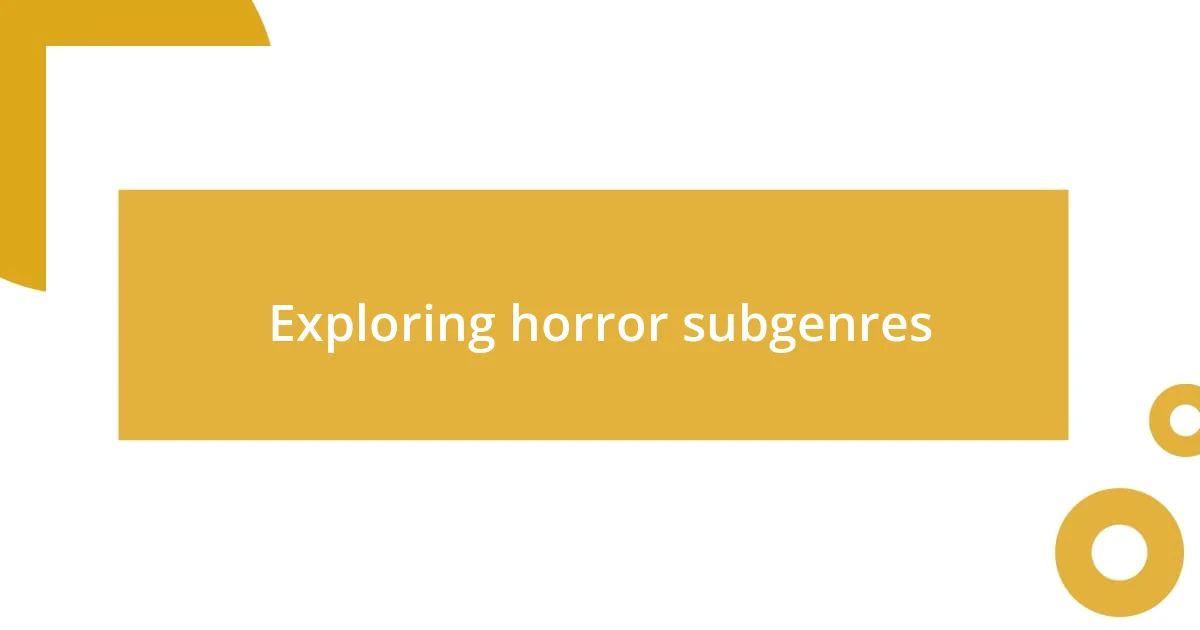
Exploring horror subgenres
Exploring horror subgenres truly deepens my appreciation for the genre. Each subgenre, from psychological to cosmic horror, taps into different fears and emotions. For instance, I’ve always found psychological horror riveting because it dives into the mind’s chaos, blurring the distinction between sanity and madness. I still recall watching a film that lingered long after the credits rolled, leaving me questioning my own reality. Isn’t it remarkable how some stories can haunt us in such a profound way?
Then there’s the realm of supernatural horror, which speaks to my fascination with the unknown. I once attended an indie film festival that showcased small, innovative horror shorts. One film featured a ghostly presence that took shape right before the protagonist’s eyes. As the protagonist’s fear escalated, so did my heartbeat, and for a moment, I felt like I was walking alongside them in that eerie night. How do creators evoke such visceral feelings through simply telling stories? This subgenre reminds me that sometimes, fear doesn’t only lurk in the dark; it can also be woven into the fabric of our everyday lives.
Lastly, I can’t overlook the charm of horror comedy—an unlikely combination that never fails to amuse me. I vividly remember a thrilling night spent watching a horror-comedy double feature with friends, where we could laugh and scream in equal measure. It was such a cathartic experience, breaking the tension and reminding me that fear doesn’t always have to be taken seriously. Isn’t it interesting how humor and horror can coexist, transforming dread into something tangible yet lighthearted? Every subtype brings its own flavor to the table, captivating me in ways I never expected.
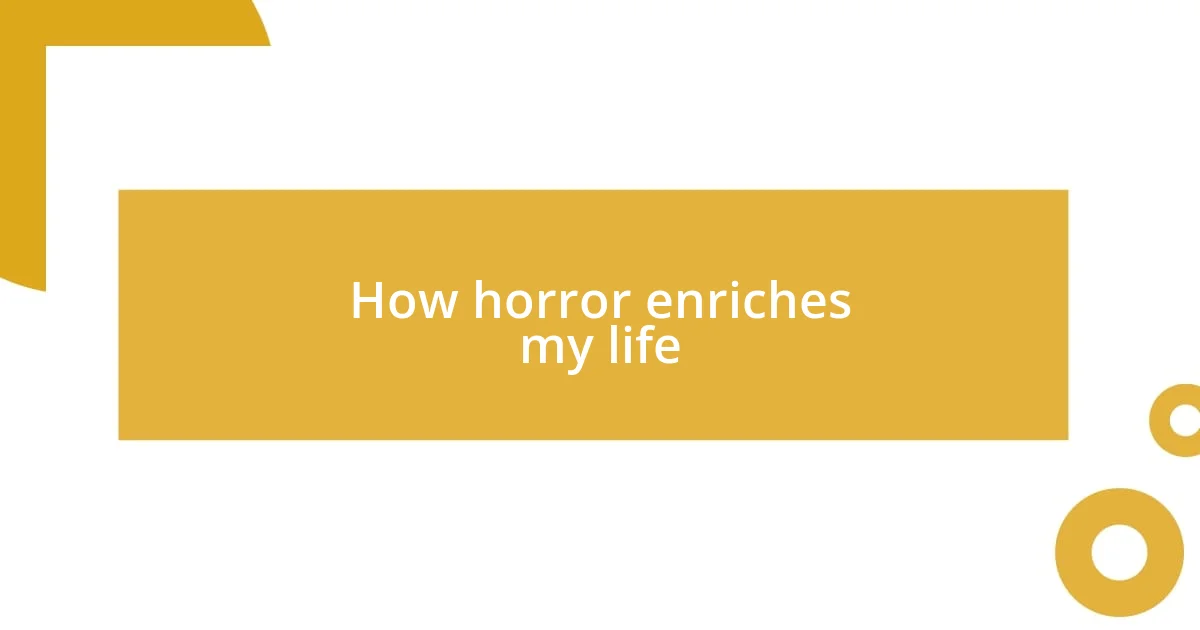
How horror enriches my life
Horror has a unique way of enriching my life by allowing me to explore my emotions in a safe environment. I fondly remember a rainy afternoon spent binge-watching classic horror movies. As I sat curled up on the couch with a blanket, I felt a mixture of anxiety and thrill with every jump scare. That moment taught me to embrace my fear instead of shying away from it. Is there anything more exhilarating than experiencing fear while knowing that you’re perfectly safe?
Beyond entertainment, horror has become a catalyst for connection with others. I once hosted a horror movie night, inviting friends over for chilling tales and snacks. As we screamed and laughed together, I realized that these shared experiences forged deeper bonds. It’s in those playful, tense moments that I feel a sense of belonging—the excitement and terror uniting us. Isn’t it incredible how horror can turn strangers into friends through laughter and shared fears?
Moreover, horror fuels my creative side, pushing me to write and craft my own chilling tales. I recall sitting down with pen and paper, inspired by a particularly eerie short story I had read. I felt an intense urge to translate that feeling into my own narratives. This drive to create has led me to explore my imagination realms I never knew existed. In many ways, isn’t it the act of creating that truly embodies the heart of horror—a journey through darkness to find light?
